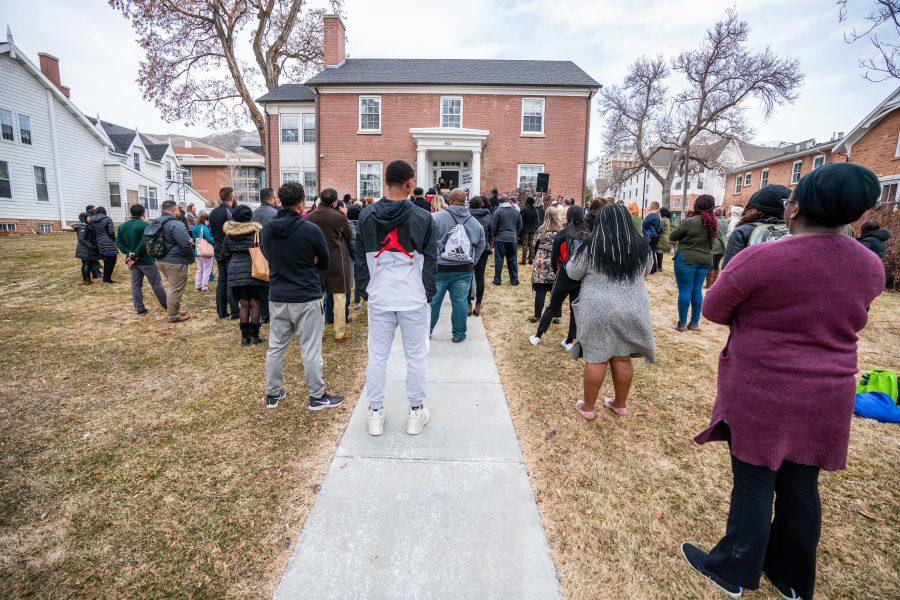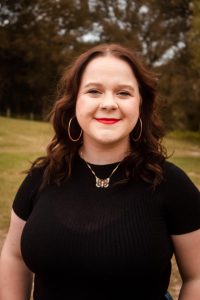Black History Month 2022 Emphasizes Black Health and Wellness
Community members and students gather for the Open House of the Black Cultural Center at the University of Utah (Courtesy of The Office for Equity and Diversity)
February 17, 2022
Black History Month takes place every February in the United States to coincide with the birthdays of Frederick Douglass and Abraham Lincoln. Meligha Garfield, director of the University of Utah’s Black Cultural Center, said to him, Black History Month is all about inclusive history.
“And the inclusive history of those that may not be talked about as often in our larger American history or larger societal aspects of what America is,” Garfield said. “Usually people of color, marginalized folks in this country, their narrative or their history is not as inclusive or included in the larger picture of what America is.”
The BCC is coming up on its third birthday, with the center officially opening on Feb. 26, 2019.
“[The Black Cultural Center’s mission is] really using a Pan-African lens — we’re here to holistically enrich, support and advocate for faculty, staff and students here at the university through Black-centered research, culturally affirming educational initiatives and service,” Garfield said. “As well as provide a space for folks, not just Black, but anybody to come to the center and learn about Blackness and be enriched in culture.”
There are events going on at the U throughout February to celebrate Black History Month. Upcoming events include History of Black Alumni, a Tribute to bell hooks and an open mic night.
“RSVP and come to some of the events that we have going on, everyone is welcome,” Garfield said.
This year’s national theme is Black Health and Wellness. Nia Brooks, a freshman majoring in biology and minoring in African American studies, said Black health and wellness is about physical, spiritual and mental health.
“The medical field and Black people have just not gone together well — the medical field has abused and taken advantage of Black people for many, many decades since the U.S. came to be and because of that, there’s this huge sort of fear when it comes to taking care of yourself or going to professionals for health,” she said. “We also think of mental health as well. We think of police brutality … having that repeated cycle of watching Black people die for no reason kind of gets on you and wears on you for a while and it causes a lot of fatigue and anxiety … We should be thinking about the holistic aspect that is learning to take care of ourselves and celebrate each other.”
Brooks is a member of a Praxis Lab, a year-long Honors course that focuses on learning about an issue in-depth and then creating a solution-based project. The theme for her class is Black perspectives. The cohort of students is working on a project this semester surrounding Black people expecting children not getting the care they need.
“So our project right now, I believe we’re focusing on getting resources out there because we fear that there aren’t enough resources or at least enough advocates spreading these resources to Black people to get them,” Brooks said.
In the medical field, Brooks said there are a lot of misconceptions and misinformation about Black people. Students in the Praxis Lab are currently reading “Medical Apartheid” by Harriet A. Washington — Brooks said she is shocked about how deep the mistreatment of Black people goes.
“I’ve learned about … how research has preyed upon Black people,” she said. “This week’s chapter is … about how medical researchers have taken advantage of Black children to perform their experiments on … [Dr. Orlando J. Andy] did a lot of brain surgery on Black kids because they associated Black kids with having more aggressive behavioral problems as a more biological trait, which is not true, and he thought the solution was to take pieces of their brain out essentially, so he was doing this on very young kids and was so proud of this.”
As a pre-med student, Brooks said she wants to change the fact that there are not a lot of Black people at the U’s medical school.
“I kind of want to change that, reframe that conversation,” she said. “You guys can go here and make a community for yourselves. I want to go and make a community for myself, but you just have to be brave and take the first step.”
In regards to education during medical school, Brooks said they need to improve their knowledge about historical racism and how to diagnose and care for Black people.
“Skin conditions on people with darker skin usually appear different and as such sometimes aren’t diagnosed correctly,” Brooks said. “Black people will come in with pain and then there’s like this horrible idea or misconception that they’re just there looking for drugs.”
While Brooks acknowledged the work the BCC puts in, she wants the U to help facilitate a more prominent community for Black students on campus.
“I haven’t really been able to connect with a lot of Black students my age or like fellow Black first years on campus because it’s so hard,” Brooks said. “The community is small but it would be nice to actually be a community on campus.”
Additionally, Brooks wants the U to speak out about national issues more frequently, like the recent police killing of 22-year-old Amir Locke.
Brooks said people should take Black History Month to celebrate Black culture, reflect and learn.
“There’s nothing stopping you from learning, pick up ‘Medical Apartheid,’ this is like my top book of the year,” she said.









